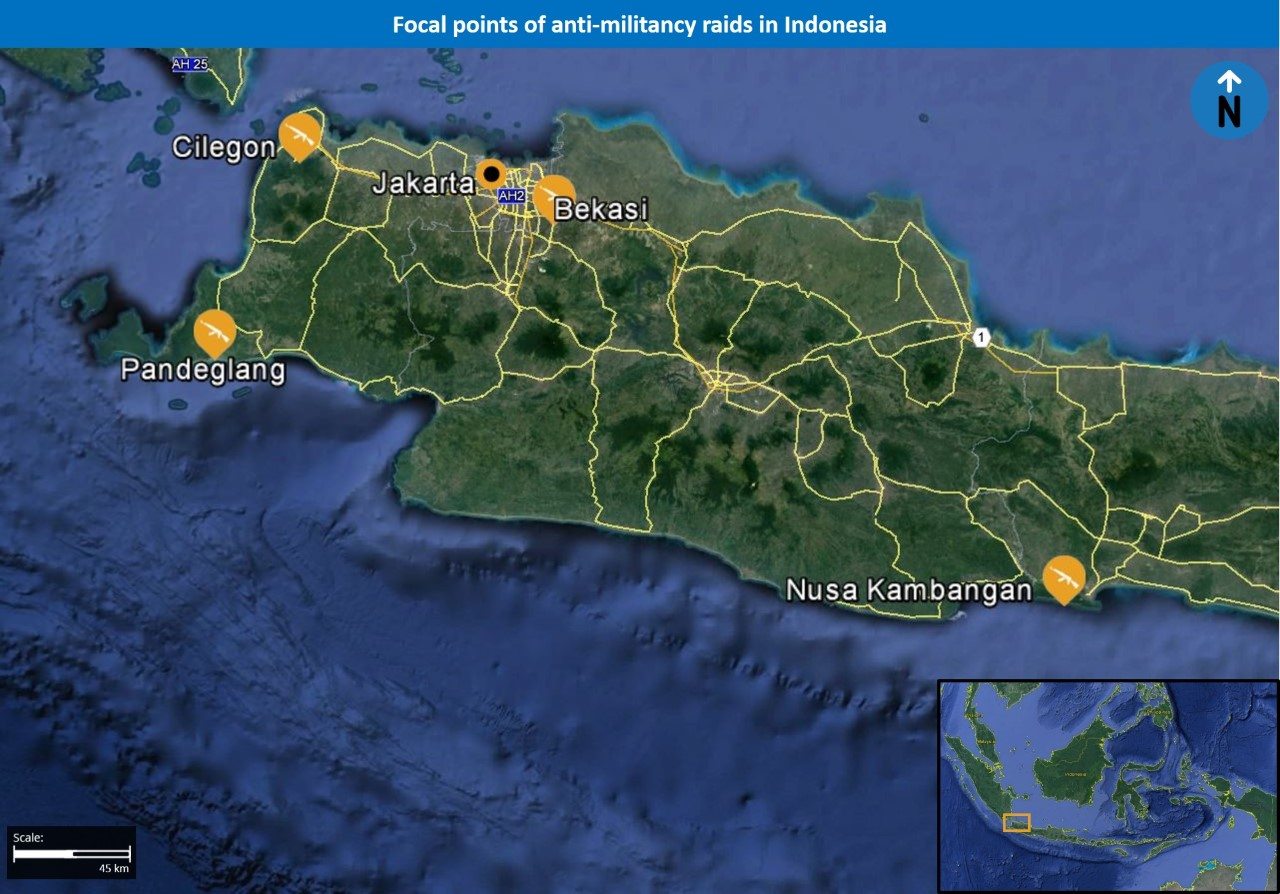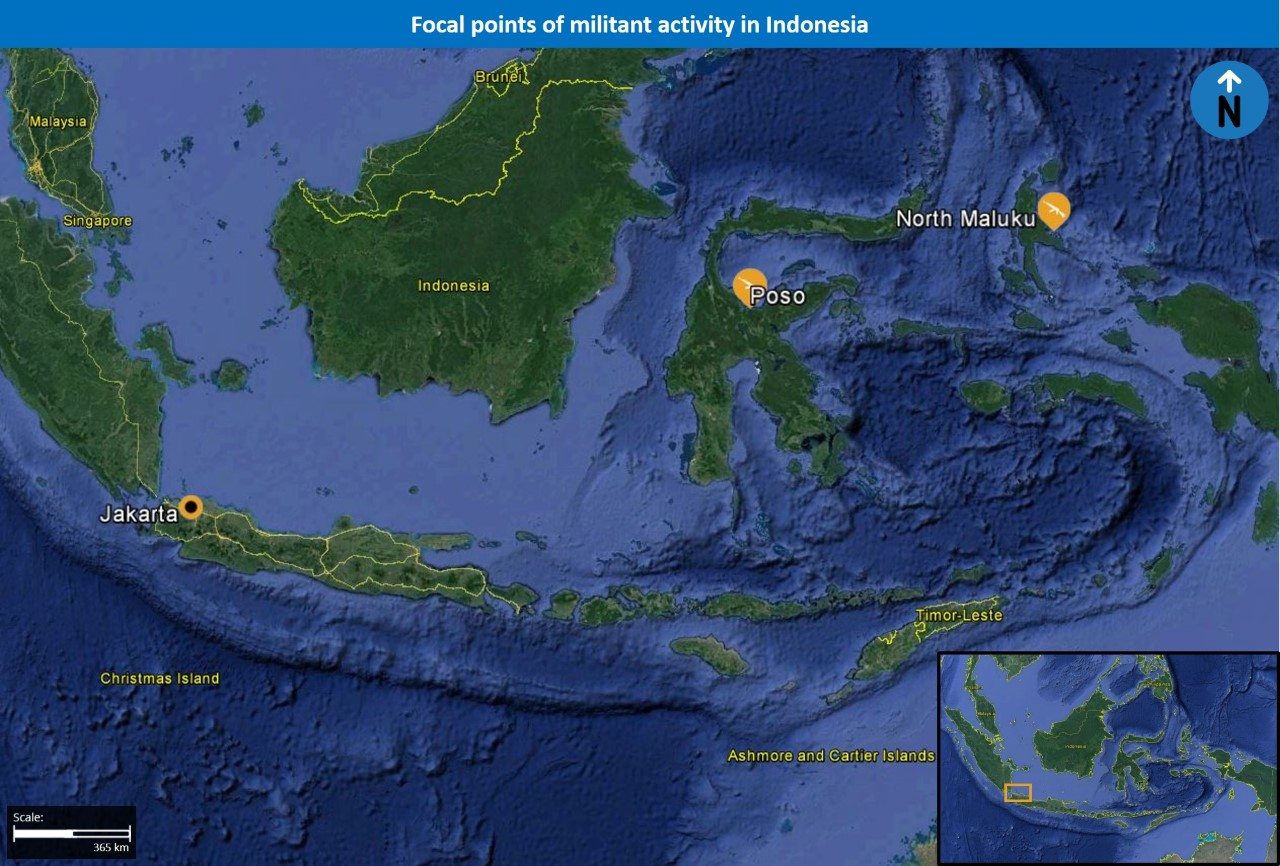Current Situation: Militants Arrested in Java Raids
According to March 24 reports, authorities claim to have arrested eight suspected militants and killed at least one with links to transnational militant group Islamic State (IS) in a series of raids along the outskirts of Jakarta this week, including in Cilegon, Banten on March 23. The most recent raids reportedly took place in Pandeglang, Banten and in Bekasi, West Java, in which a suspected financier of the IS-claimed Jakarta attack in January 2016 was arrested. The man was reportedly linked to militant networks in the southern Philippines.
Police identified the militant shot dead in the March 23 raid as Nanang Kosim; an individual believed to have attended meetings of the Indonesia-based Jamaah Ansharut Daulah (JAD) militant group in Batu, Malang in East Java in November 2016. Authorities claim that Nanang had assisted a militant identified as Abu Asybal to evade police detection following his involvement in the January 2016 attack. Nanang is also believed to have been supplying JAD with assault rifles from the Philippines, and plotting to eventually shift their militant base from Poso, Central Sulawesi to Halmahera in North Maluku. During the arrests, police reportedly seized some explosive-making materials including fertilizers, sulfur and nails.
Furthermore, counter-militancy authorities claim that Indonesian militant Iwan Darmawan, currently sentenced to death for his role in the 2004 bombing of the Australian Embassy in Jakarta, directed the procurement of rifles while incarcerated at the Nusakambangan maximum security prison in Central Java. Darmawan is believed to have directed a JAD militant to make several trips to the southern Philippines to procure weapons and to make contact with Isnilon Hapilon, the leader of the IS-affiliated Abu Sayyaf group in the Philippines, although the time of the directive remains unclear.
Assessments & Forecast
FORECAST: While the extent and nature of links between the Abu Sayyaf group and JAD remain unknown, the developments suggest a relatively high degree of coordination, especially in aiding JAD elements in Indonesia. JAD is known to operate using local, independent cells to conduct attacks in and around Jakarta, and for using lesser sophisticated explosives like pressure-cooker bombs. In this context, JAD’s attempts to procure more sophisticated weaponry from Abu Sayyaf suggest a reorientation of their focus toward more ambitious attacks. This was evident in the reported uncovering of explosive material during the aforementioned raid.
The desire for increased cooperation may be a reaction to a notable uptick in counter-militancy raids carried out by Indonesian security forces over past months. In light of growing pressure against militant cells in major urban centers, increased cooperation with Abu Sayyaf would allow JAD to better develop safe havens and supply channels in the restive Celebes Sea, where militant groups operate with far greater impunity. It is likely in this context that JAD was attempting to shift their base of operations to the more peripheral area of North Maluku’s Halmahera area, allowing them direct access to the waters. FORECAST: Further, establishing a more consolidated presence in these areas may compel security forces to divert a significant amount of manpower and resources to these isolated areas in order to dislodge the group. This would likely leave major urban centers more vulnerable, alleviating pressure on local cells and allowing for more space to conduct attacks.
Recommendations
Travel to Jakarta may continue at this time while maintaining heightened vigilance throughout the city given the now increased risk of militancy. Those operating or residing in Jakarta are advised to maintain heightened vigilance in the vicinity of government buildings, transportation hubs, iconic public areas, military bases, restaurants, high-value soft targets, shopping centers, and religious centers including mosques and churches, as they remain potential targets for militant attacks.


